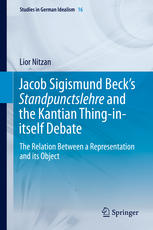

Most ebook files are in PDF format, so you can easily read them using various software such as Foxit Reader or directly on the Google Chrome browser.
Some ebook files are released by publishers in other formats such as .awz, .mobi, .epub, .fb2, etc. You may need to install specific software to read these formats on mobile/PC, such as Calibre.
Please read the tutorial at this link: https://ebookbell.com/faq
We offer FREE conversion to the popular formats you request; however, this may take some time. Therefore, right after payment, please email us, and we will try to provide the service as quickly as possible.
For some exceptional file formats or broken links (if any), please refrain from opening any disputes. Instead, email us first, and we will try to assist within a maximum of 6 hours.
EbookBell Team

0.0
0 reviewsThis book examines the unique views of philosopher Jacob Sigismund Beck, a student of Immanuel Kant who devoted himself to an exploration of his teacher's doctrine and to showing that Kant’s transcendental idealism is, contra to the common view, both internally consistent and is not a form of subjective idealism. In his attempt to explain away certain apparent contradictions found in Kant's system, Beck put forward a new reading of Kant’s critical theory, a view, which came to be known as the Standpunctslehre, the Doctrine of the Standpoint.
Author Lior Nitzan reconstructs, step by step, the historical development of Beck’s doctrine. He shows how Beck's unique view is drastically different from that of his contemporaries and presents the relevance of Beck to contemporary debates about the proper interpretation of Kant’s notion of objectivity, the refutation of idealism and the role of the thing in itself in Kant’s transcendental idealism. In doing so, Nitzan presents a defense of Beck's radical perspective of Kant’s theory and claims that some of Kant’s negative responses to it may in fact be due more to the adversary academic environment at the time than to Kant’s true, well considered, opinion.
Jacob Sigismund Beck’s Standpunctslehre challenges the two dominant schools in the interpretation of Kant’s transcendental idealism—the "two world" and the "two aspect" view. It presents a new way of understanding Kant’s transcendental idealism, according to which the thing in itself plays no positive role in relation to the possibility of experience. Moreover, it claims that eliminating the thing in itself as the ultimate object of knowledge is not to admit idealism but in fact is the only way to consistently uphold realism. In addition, the book also addresses the question why, assuming that the proposed interpretation is correct, Kant had chosen not to make his true intentions clear.